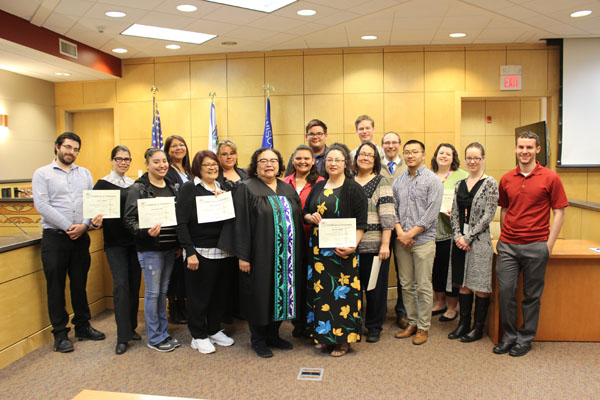Ho-Chunk Judiciary trains, adds 12 new lay advocates
By Ken Luchterhand

When it comes to appearing in court, its nice to receive a helping hand. In the sometimes-complex legal process, lay advocates can provide the legal assistance to get through the ordeal.
For that reason, the Ho-Chunk Nation joins efforts with Wisconsin Judicare Inc. to provide legal training for Ho-Chunk members to become lay advocates.
The Ho-Chunk Judiciary provided such a training from Monday, May 1 through Thursday, May 4, at the Ho-Chunk Tribal Court in Black River Falls. Twelve trainees participated and received their certification.
“Lay advocates are licensed to practice law in court, but are not attorneys,” said W. Noah Lentz, attorney with Wisconsin Judicare and one of the trainers. “They can represent Ho-Chunk members in court who otherwise might have no one to support them.”
The four-day course provided an insight on court procedures and proper ways of providing a proper defense or prosecution, such as submitting evidence to the court.
On the last day of training, the lay advocate trainees were required to participate in a mock trial before Judge Mary Jo Hunter. The case involved a father who was requesting sole custody of his son who had a disability. The father wanted to move out of state because of a job offer he had received.
The trainees were split into different groups and presented the case in different sessions, with each taking a role as representative on either the plaintiff’s or the defendant’s side.
“This was an eager group,” Lentz said. “They took their jobs seriously and they put a lot of effort into it.”
During the first two days, the trainees were taught about basic legal practices and procedures, which involved viewing many PowerPoint programs, Lentz said. They learned about issues like child support and custody, and other issues common in court proceedings.
Upon completion of the lay advocate training, each participant received a certificate, which allows him or her to become part of the Ho-Chunk Bar Association. They are then licensed to practice law in court and their names are listed with the front desk, where people may inquire for legal assistance but don’t want to hire a lawyer.
Although historically most lay advocates within the Ho-Chunk Nation have only been used for more simple cases, there are instances, such as with the Menomonee Nation where lay advocates have represented defendants in criminal cases, Lentz said.
Home